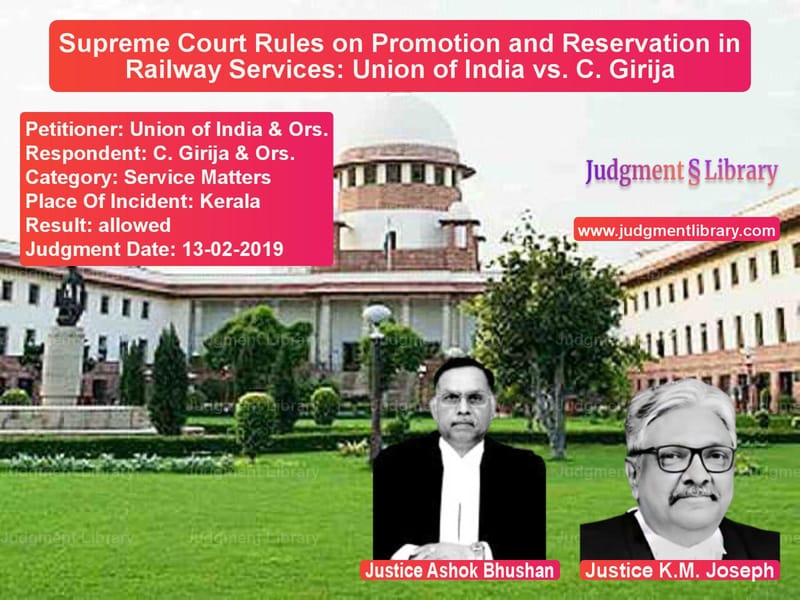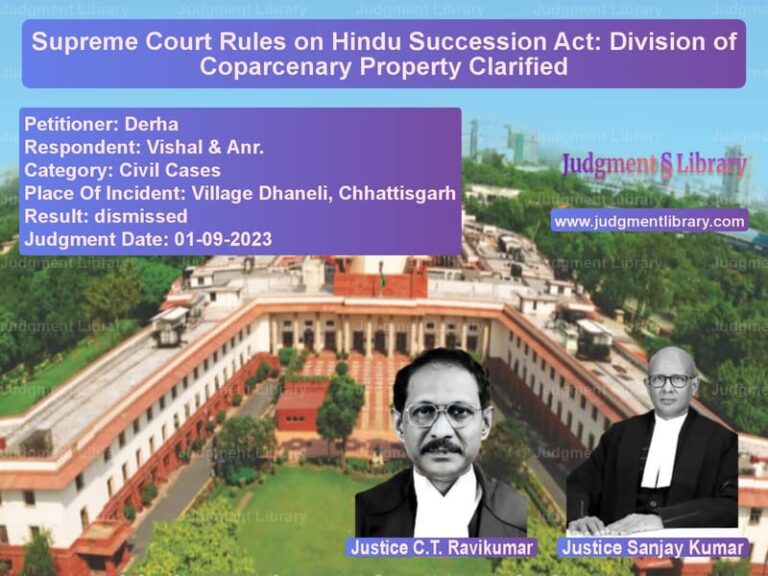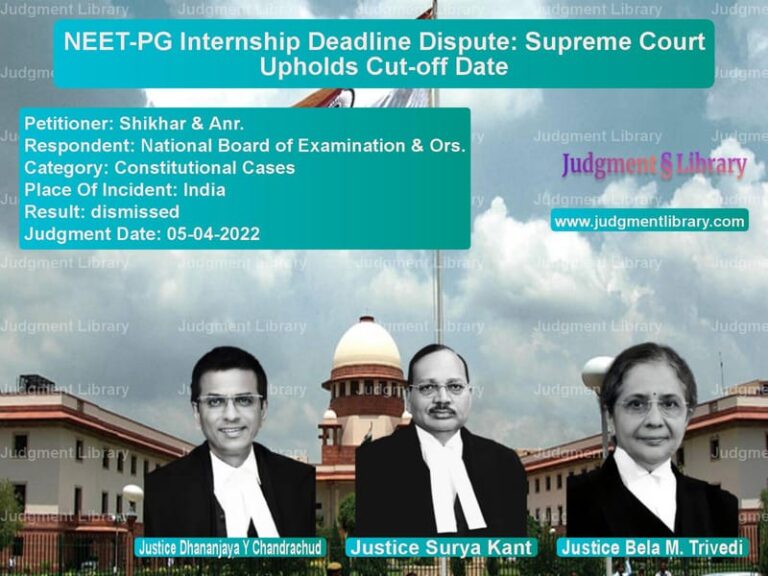Supreme Court Rules on Promotion and Reservation in Railway Services: Union of India vs. C. Girija
The Supreme Court of India, in Union of India vs. C. Girija, ruled on the legal validity of reservation in promotions under the Limited Departmental Competitive Examination (LDCE) quota in Southern Railway. The case involved a dispute over the allocation of seats for Scheduled Caste (SC) candidates and delay in challenging the selection process.
Background of the Case
The case began with a notification issued on October 14, 1999, by the Southern Railway for the selection of Group ‘C’ employees to Group ‘B’ posts in the Personnel Department. The notification specified that five vacancies would be filled through the 30% LDCE quota, with four unreserved and one reserved for SC candidates.
C. Girija, who was working as an Office Superintendent in the Personnel Branch, applied for the examination under the unreserved category. After the written test and viva voce, a panel was issued on January 9, 2001, where she was placed as the fifth candidate in the unreserved category. However, she was not selected, while Meena Bhaskar, an SC candidate, was selected under the reserved category.
Meanwhile, another selection process under the 70% promotion quota took place in April 2001, and a panel was issued. This panel was later revised in 2007, resulting in the inclusion of additional SC candidates. After learning about these changes, Girija filed a representation on September 25, 2007, to the General Manager of Southern Railway, requesting her inclusion in the original panel. She claimed that the reservation for SC candidates in the 30% LDCE quota was improper.
Legal Dispute and Tribunal’s Decision
The General Manager rejected her request on December 27, 2007. Girija then filed OA No. 466 of 2009 before the Central Administrative Tribunal (CAT), challenging the 2001 panel. The Tribunal, despite a 560-day delay in filing, ruled in her favor, directing her inclusion in the 30% LDCE panel and granting her notional promotion from 2001.
The Tribunal’s order required:
- Girija’s inclusion in the 30% LDCE panel from January 9, 2001.
- Her placement above Meena Bhaskar in the seniority list.
- Adjustment of Meena Bhaskar against any subsequent vacancy.
Meena Bhaskar and the Union of India appealed this decision before the Kerala High Court, which upheld the Tribunal’s ruling on February 6, 2015. The matter was then taken to the Supreme Court.
Supreme Court’s Observations
1. Delay and Laches in Challenging Promotion
The Supreme Court noted that Girija had participated in the selection process without objecting to the reservation quota. She waited for more than six years before filing her representation in 2007, which the court ruled was excessive. Citing previous judgments, the Court stated:
“A stale claim cannot be revived merely because a representation has been filed and subsequently rejected. The doctrine of delay and laches applies to service matters, particularly in promotion cases.”
2. Legality of Reservation in 30% LDCE Quota
The Court upheld the allocation of one SC-reserved seat in the 30% LDCE quota. The affidavit submitted by the Southern Railway explained that reservation was determined based on roster points. The Court held:
“The calculation of vacancies and reservation quotas was done per established norms, and there was no illegality in allocating one seat to SC candidates.”
3. Participation Without Protest
Girija had participated in the selection process without raising any objections at the time. The Court reiterated that:
“A candidate who participates in a selection process without objection and later challenges it only after being unsuccessful is barred from relief under the principle of approbation and reprobation.”
4. Impact on Seniority and Service Stability
The Supreme Court emphasized the importance of service stability. It stated that promotions and seniority positions granted years earlier should not be disturbed unless there is a clear violation of fundamental rights.
Final Judgment
The Supreme Court allowed the appeals filed by the Union of India and Meena Bhaskar, setting aside the orders of the Tribunal and the High Court. It ruled that:
- Girija’s claim was barred by delay and laches.
- The reservation of one SC seat in the 30% LDCE quota was valid.
- The promotions made in 2001 should not be disturbed.
- However, Girija was entitled to her full retirement benefits, with 8% interest per annum from July 1, 2015.
Key Takeaways
- Service-related grievances should be raised promptly: Employees must challenge selection processes within a reasonable time.
- Participation without protest bars later challenges: Candidates who accept a process and later challenge it after failing cannot claim relief.
- Legality of reservation quotas: Courts uphold reserved quotas if they are in accordance with roster points.
- Seniority and stability in services: Long-settled promotions should not be disturbed unless there is a serious legal flaw.
- Compensation for delayed benefits: The Court awarded Girija retirement benefits with interest.
Conclusion
The Supreme Court’s ruling in Union of India vs. C. Girija is an important precedent in service law, particularly concerning reservation in promotions and the doctrine of delay and laches. The judgment reinforces that selection processes must be challenged in a timely manner and that courts must be cautious in unsettling past promotions to maintain service stability.
Petitioner Name: Union of India & Ors..Respondent Name: C. Girija & Ors..Judgment By: Justice Ashok Bhushan, Justice K.M. Joseph.Place Of Incident: Kerala.Judgment Date: 13-02-2019.
Don’t miss out on the full details! Download the complete judgment in PDF format below and gain valuable insights instantly!
Download Judgment: Union of India & Ors vs C. Girija & Ors. Supreme Court of India Judgment Dated 13-02-2019.pdf
Direct Downlaod Judgment: Direct downlaod this Judgment
See all petitions in Recruitment Policies
See all petitions in Public Sector Employees
See all petitions in Promotion Cases
See all petitions in Judgment by Ashok Bhushan
See all petitions in Judgment by K.M. Joseph
See all petitions in allowed
See all petitions in supreme court of India judgments February 2019
See all petitions in 2019 judgments
See all posts in Service Matters Category
See all allowed petitions in Service Matters Category
See all Dismissed petitions in Service Matters Category
See all partially allowed petitions in Service Matters Category







